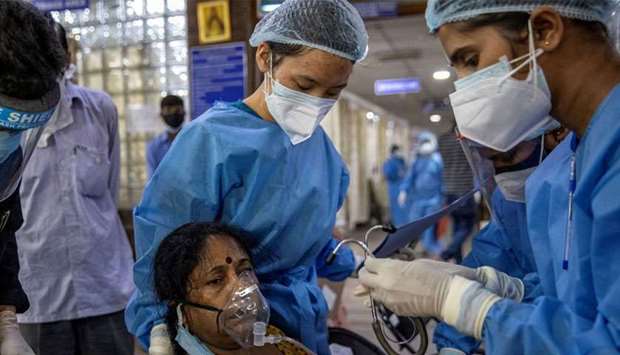India postponed exams for trainee doctors and nurses yesterday, freeing them up to fight the world’s biggest surge in coronavirus infections, as the health system crumbles under the weight of new cases and hospitals run out of beds and oxygen.
The total number of infections so far rose to just short of 20mn, propelled by a 12th straight day of more than 300,000 new cases in a pandemic sparked by a virus first identified in central China at the end of 2019.
Medical experts say actual numbers in India could be five to 10 times higher than those reported. Hospitals have filled to capacity, supplies of medical oxygen have run short, and morgues and crematoriums have been overloaded with corpses.
Patients are dying on hospital beds, in ambulances and in carparks outside. “Every time we have to struggle to get our quota of our oxygen cylinders,” said B H Narayan Rao, a district official in the southern town of Chamarajanagar, where 24 Covid-19 patients died, some from a suspected shortage of oxygen supplies.
“It’s a day-to-day fight,” added Rao, as he described the hectic scramble for supplies.
In many cases, volunteer groups have come to the rescue.
In the capital New Delhi, Sikh volunteers were providing oxygen to patients lying on benches inside makeshift tents, hooked up to a giant cylinder. Every 20 minutes or so, a new patient came in. “No one should die because of a lack of oxygen. It’s a small thing otherwise, but nowadays, it is the one thing every one needs,” Gurpreet Singh Rummy, who runs the service, said.
Total infections since the start of the pandemic have reached 19.93mn in India, swelled by 368,147 new cases over the past 24 hours, while the death toll rose by 3,417 to 218,959, health ministry data showed.
At least 3.4mn people are currently being treated.
Offering a glimmer of hope, the health ministry said positive cases relative to the number of tests fell yesterday for the first time since at least April 15.
Modelling by a team of government advisers shows coronavirus cases could peak by tomorrow, a few days earlier than a previous estimate, since the virus has spread faster than expected.
At least 11 states and regions have ordered curbs on movement to stem infections, but Prime Minister Narendra Modi’s government, widely criticised for allowing the crisis to spin out of control, is reluctant to announce a national lockdown, concerned about the economic impact.
“In my opinion, only a national stay at home order and declaring medical emergency will help to address the current healthcare needs,” Bhramar Mukherjee, an epidemiologist with the University of Michigan, said on Twitter.
As medical facilities near breaking point, the government postponed an exam for doctors and nurses to allow some to join the coronavirus battle alongside existing personnel.
In Pune, the second-largest city in the state of Maharashtra, Dr Mekund Penurkar returned to work just days after losing his father to Covid-19. His mother and brother are in hospital with the virus, but patients are waiting to see him.
“It is a very difficult situation,” he said. “Because I have been through such a situation myself, I can’t leave other patients to their fate.”
Modi has been criticised for not moving sooner to limit the spread and for letting millions of largely unmasked people attend religious festivals and crowded political rallies in five states during March and April.
In early March, a forum of government scientific advisers warned officials of a new and more contagious variant of the coronavirus taking hold, five of its members said.
Despite the warning, four of the scientists said the federal government did not seek to impose major curbs.

(File photo) A patient suffering from the coronavirus disease (COVID-19) receives treatment inside the emergency ward at Holy Family hospital in New Delhi. (REUTERS)
